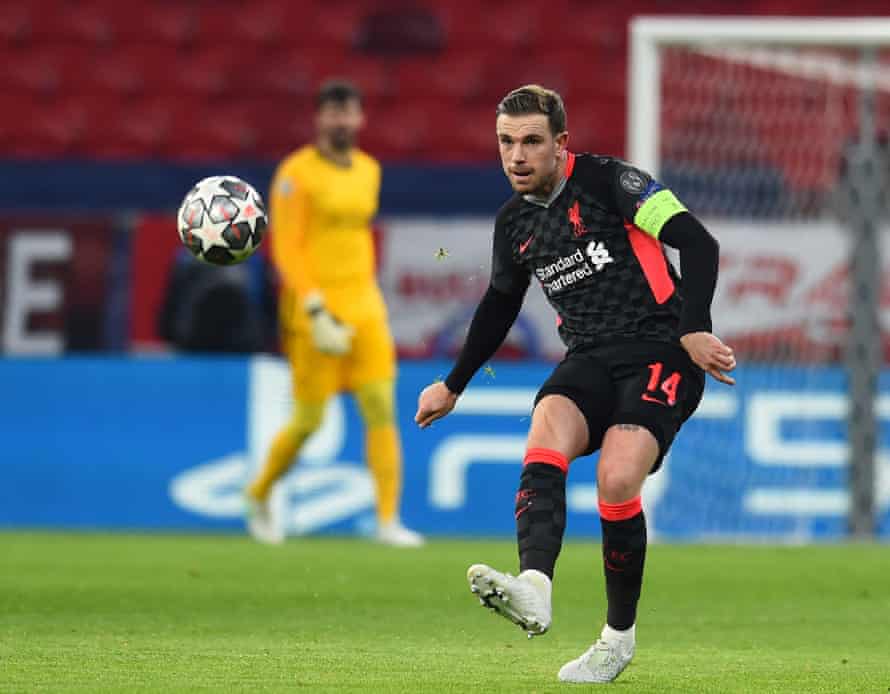The main stadium in Budapest used to be the Nepstadion, or “People’s Stadium”: the vast marble-lined Communist-era monolith where the Magical Magyars beat England 7-1 in 1954 and Louis Armstrong played to 80,000 people in 1965.
A few years ago it was demolished and replaced by the Puskas Arena: a vast and costly monument to the vanity of Hungary’s right-wing populist prime minister Viktor Orban, and which for one night only was the designated home ground of RB Leipzig, a club from 500 miles away established by a soft drink company to get round Bundesliga ownership rules. If you wanted a snapshot of European football in 2021, then this felt like a pretty good place to start.
But it wasn’t just the setting that added a disorienting neoteric sheen to proceedings. As Liverpool skipped and manoeuvred their way past a beautiful but brittle Leipzig in a thrilling, highly-strung last-16 first leg, it was possible to glimpse a vision of the game’s near future, or very possibly its present.
Daringly high full-backs, breathtaking switches in play, goalkeepers venturing halfway to the centre circle, a gripping 90-minute struggle for territory and momentum: perhaps this is just what football looks like now, at least at its elite end.
Julian Nagelsmann may be the coming force in European coaching, a magnetic field of new ideas and repackaged old ones. But it will be of some comfort to Liverpool, and Jürgen Klopp, that they are still more than capable of raising their game to compete.
In a way, Leipzig’s willingness to go toe-to-toe was probably the key to Liverpool’s triumph. It was a similar story in Bergamo during the group phase, when Liverpool beat Atalanta 5-0: the novelty of fresh questions and a fresh challenge, a break from the twice-weekly Premier League treadmill, the realisation that football can be more than simply coming up against massed 10-man defences that let you walk the ball to the halfway line. Liverpool enjoy it when teams try to play against them, which is probably why so few bother.

And last year’s semi-finalists certainly came to play. Nagelsmann set his Leipzig team out in a close cousin of the 3-1-4-2 he deployed at Anfield when he was Hoffenheim manager in 2017: the two wing-backs pushed well up the pitch, the back three seeking to provoke the opposition press before hitting the front two with accurate long balls.
“It’s still not clear which system they will play,” Klopp said on seeing the team sheet. “We can identify the offensive and defensive players, but how they set up, we will see.”
Pretty soon it became clear that the battle on the flanks would be pivotal. For Leipzig, Angeliño and Tyler Adams looked to engage Trent Alexander-Arnold and Andy Robertson early on: pinning them back, forcing them into rushed clearances. Angeliño had some early joy, squeezing past Alexander-Arnold and providing a cross to Dani Olmo, who hit the post. But there was a risk to this approach, too: if you can beat the press and get the ball forward quickly, you can often generate three-on-three situations at the other end.
This was what Alexander-Arnold managed on 15 minutes, sliding Mohamed Salah through on goal, from where he should have done better. From around 20 minutes in, Liverpool began to ease into the game. Jordan Henderson, staring at the bleak prospect of spending the rest of his career as a centre-half, treated us to a delightful selection of long balls and Hail Mary passes. Salah and Thiago Alcântara upped their defensive work rate. On the touchline, Klopp wildly swung his fists, contorted his grizzled features into an ugly grimace, sprayed the air with oaths. That’s how you could tell he was enjoying himself.
The Fiver: sign up and get our daily football email.
Having earned the right to play, Liverpool made their supremacy count. Spooked by Liverpool’s pinpoint counter-press, Leipzig’s captain, Marcel Sabitzer, presented the ball straight to Salah, who opened the scoring early in the second half.
Then on the hour, the excellent Curtis Jones lofted a hopeful ball over the top for Sadio Mané. A nothing ball. A low-percentage ball. The sort of ball some annoying American analyst would probably advise you not to play. But again Mané’s pounding press drew the error, Nordi Mukiele slipped over and Mané put Liverpool 2-0 up.
And so, in front of a crowd of zero in Orban’s biosecure pleasure-dome, Liverpool rediscovered a little of their vim. Where now from here? The league is surely a lost cause. But a seventh European Cup is certainly not beyond them from this point. If they can get a few players back, grind out some results, and above all bottle the sense of purpose and occasion and intensity that was on evidence here, then they may yet be able to bring this most peculiar of seasons to a time-honoured conclusion.
from Football | The Guardian https://ift.tt/37od7Vo
via IFTTT

No Comment